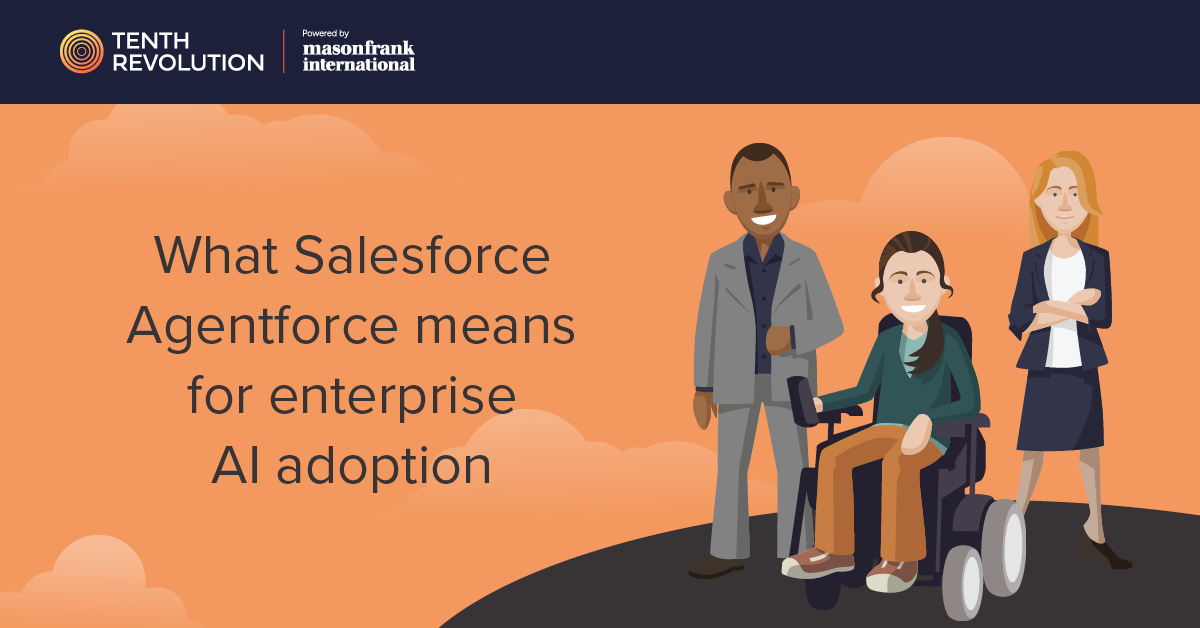
Salesforce is entering a new era of AI: one where Copilot evolves into Agentforce, secure, CRM-grounded agents that can take action, not just generate answers.
Einstein 1 is redefining the Salesforce ecosystem. What started as conversational assistants is becoming an integrated network of AI agents capable of completing real business tasks safely within governed enterprise environments.
For business leaders, this shift represents a turning point in how AI supports customer operations, sales performance, and decision-making.
Below, we answer the key questions hiring managers and executives are asking about Agentforce and what it means for the teams that keep Salesforce running.
What exactly is Agentforce?
Agentforce is Salesforce’s new layer of action-oriented AI built on the Einstein 1 Platform. Unlike earlier chat-style copilots that provided suggestions or summaries, Agentforce enables AI to act directly within CRM workflows creating records, updating data, sending messages, and triggering automations in real time.
These capabilities are grounded in Salesforce’s secure data model, meaning the agents work with governed, contextual information rather than open web data. Each action is authenticated, logged, and compliant with enterprise access controls.
In short, it’s the difference between receiving advice and watching AI execute that advice automatically and safely.
How is this different from traditional copilots?
Copilot has been a useful conversational layer for users, helping them retrieve information or draft content. Agentforce extends that capability into the operational layer of Salesforce.
Rather than stopping at recommendations, Agentforce completes tasks. For example:
- A sales rep could ask an agent to generate and send a proposal directly to a client.
- A service team could let AI close a resolved case and update related records.
- A marketing manager could use an agent to launch a campaign segment automatically based on CRM insights.
This marks a move from assistance to autonomous execution, all within the security and compliance boundaries enterprises require.
What makes this shift possible?
The Einstein 1 Platform provides the foundation. Its unified data model connects every Salesforce application, making it possible for AI to understand business context and take action confidently.
Key technologies include:
- Einstein Trust Layer, which manages security, privacy, and compliance for AI interactions.
- Data Cloud, which consolidates and cleanses CRM and external data for real-time context.
- Prompt Builder and Model Builder, enabling custom, domain-specific AI behaviors trained on trusted datasets.
Together, these elements make Agentforce possible, AI that acts safely and intelligently within enterprise systems.
How does this affect hiring strategies?
The rise of Agentforce is reshaping the demand for Salesforce professionals. Businesses now need teams who can deploy, secure, and optimize these intelligent agents responsibly.
High-demand skills include:
- AI solution architecture, for integrating Agentforce into existing Salesforce environments.
- Data governance and security, ensuring AI actions comply with privacy and access rules.
- Automation and Flow expertise, as agents increasingly interact with Salesforce automations.
- Change management and training, to prepare users for a new AI-driven workflow model.
According to Mason Frank’s Careers and Hiring Guide: Salesforce Edition 2025, demand for professionals skilled in AI implementation and governance is growing rapidly across Salesforce and related ecosystems.
Mason Frank helps enterprises hire Salesforce professionals who can bring AI transformation to life securely, strategically, and at scale.
What challenges will enterprises face with Agentforce?
Like any major platform evolution, Agentforce introduces new governance requirements. Enterprises will need to address:
- Model transparency: understanding why an AI took a specific action.
- Access control: ensuring agents only perform tasks they are authorized to complete.
- Training and adoption: helping employees trust and collaborate with AI in daily operations.
Organizations that plan early building the right roles, guardrails, and processes will transition more smoothly to this new AI model.
What should leaders do now to prepare?
- Audit your data. Clean, unified data is the foundation of successful Agentforce adoption.
- Define governance structures. Identify who owns AI oversight and accountability.
- Invest in AI-ready talent. Bring in professionals who understand both Salesforce architecture and AI orchestration.
- Educate teams early. The faster employees understand what Agentforce can and cannot do, the safer and more productive adoption will be.
Enterprises that treat this as a business transformation, not just a technical one will be best positioned to lead in the next generation of CRM-driven AI.
The next stage of Salesforce AI
Agentforce marks a defining moment for enterprise AI strategy. It signals the move toward trusted, action-oriented automation grounded in real business data. With the right people and processes in place, organizations can scale productivity while maintaining security and compliance.


